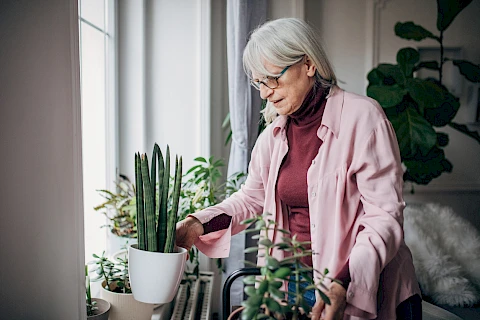
The shorter days and colder temperatures can make outdoor gardening less practical. But the joy and benefits of gardening don't have to end just because it's fall or winter. Indoor gardening for fall and winter offers an excellent way for seniors to stay active, engaged, and surrounded by greenery in the colder months.
Choosing the Right Plants
Low-maintenance plants work best for indoor gardening in the fall and winter. Snake plants, pothos, and ZZ plants are perfect for indoor gardening as they require minimal care. For homes with limited natural light during fall and winter, consider plants that thrive in low-light conditions, such as peace lilies, philodendrons, and cast iron plants. Adding edible plants like basil, mint, and parsley can also bring joy to your kitchen.
Setting Up the Perfect Indoor Garden
Choose plant containers with drainage holes to prevent water from sitting at the bottom and avoid root rot. Place a saucer beneath the pot to catch excess water, and remember to empty it regularly. Find a spot in your home that gets optimal light for your plants. South-facing windows offer the most sunlight during the winter months.
Creating the Ideal Environment
Maintaining an ideal environment will help your indoor garden flourish. If natural light is limited, consider using grow lights to provide the spectrum of light your plants need to thrive. Indoor air can become very dry during the winter. Use a humidity tray or a small humidifier to maintain adequate moisture for your plants.
Be mindful of cold drafts and hot radiators, which can harm your plants. Most indoor plants prefer temperatures between 65-75 degrees Fahrenheit. Overwatering is another common mistake, so check the soil before watering. It should feel dry an inch below the surface. Water less frequently in the winter as plants generally grow slower.
Reduce fertilizer application during winter, as most plants require less nutrition when their growth slows down. Trim dead leaves and overgrowth to keep your plants healthy. Remember to check for pests like spider mites or aphids, treating them with natural remedies if needed.
Benefits of Indoor Gardening for Seniors
Gardening indoors promotes physical activity, ensuring seniors maintain mobility and flexibility while caring for their plants. However, they must consult their doctor before starting a new physical activity. Caring for plants can reduce stress and anxiety. Watching plants grow provides a sense of accomplishment and purpose. Gardening can also be a shared activity with family and friends, ensuring seniors remain socially engaged and connected.
Discover the Joys of Indoor Gardening This Fall and Winter
Indoor gardening for fall and winter can be a rewarding experience for seniors. If you’re considering setting up your own indoor green space in the colder months and could use some help with other daily living tasks at home, we can help. Senior Helpers Northwest Indiana provides professional in-home senior care solutions, including companionship, support with hobbies, light housekeeping, and other facets of elderly care. Contact us for personalized senior care solutions in Crown Point, Gary, Hammond, Lake County, and East Chicago!